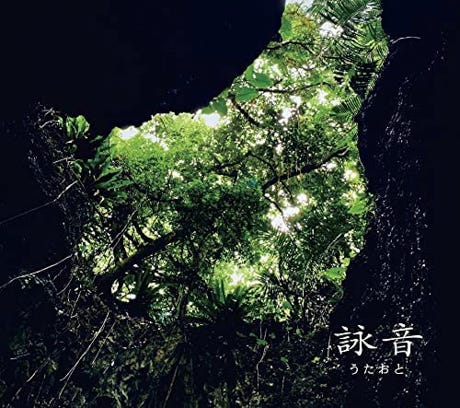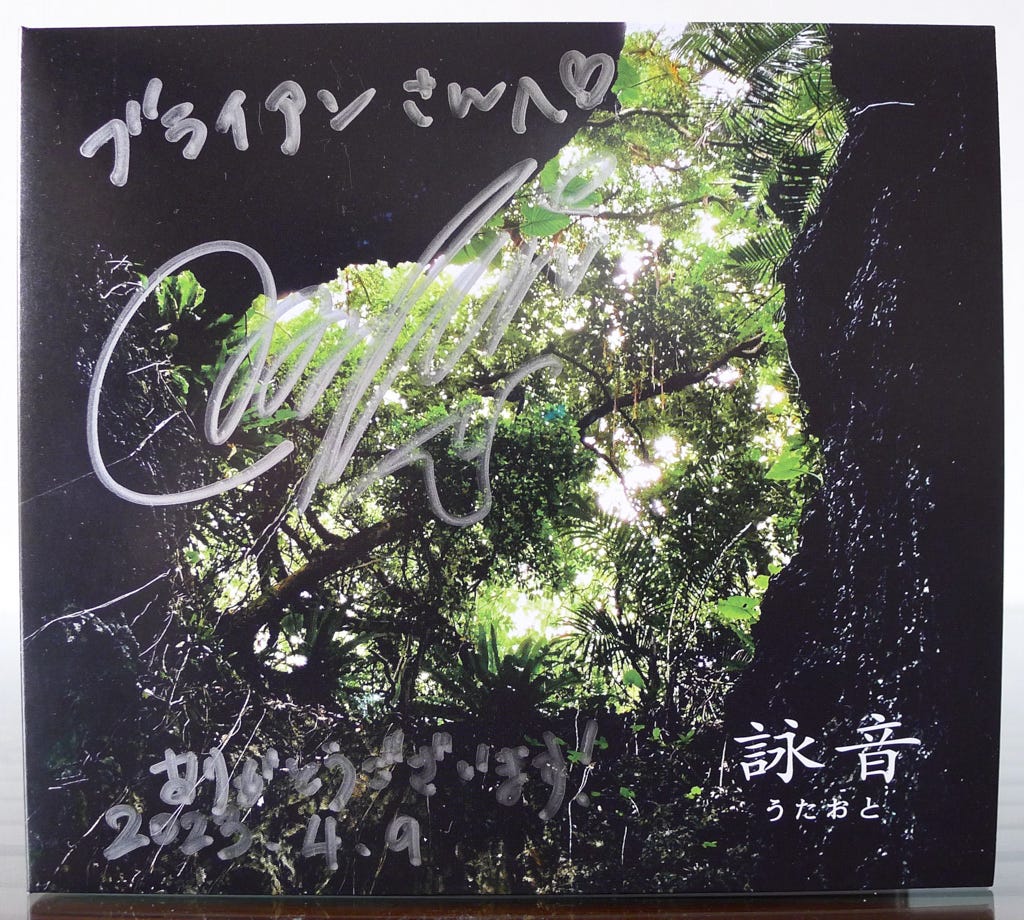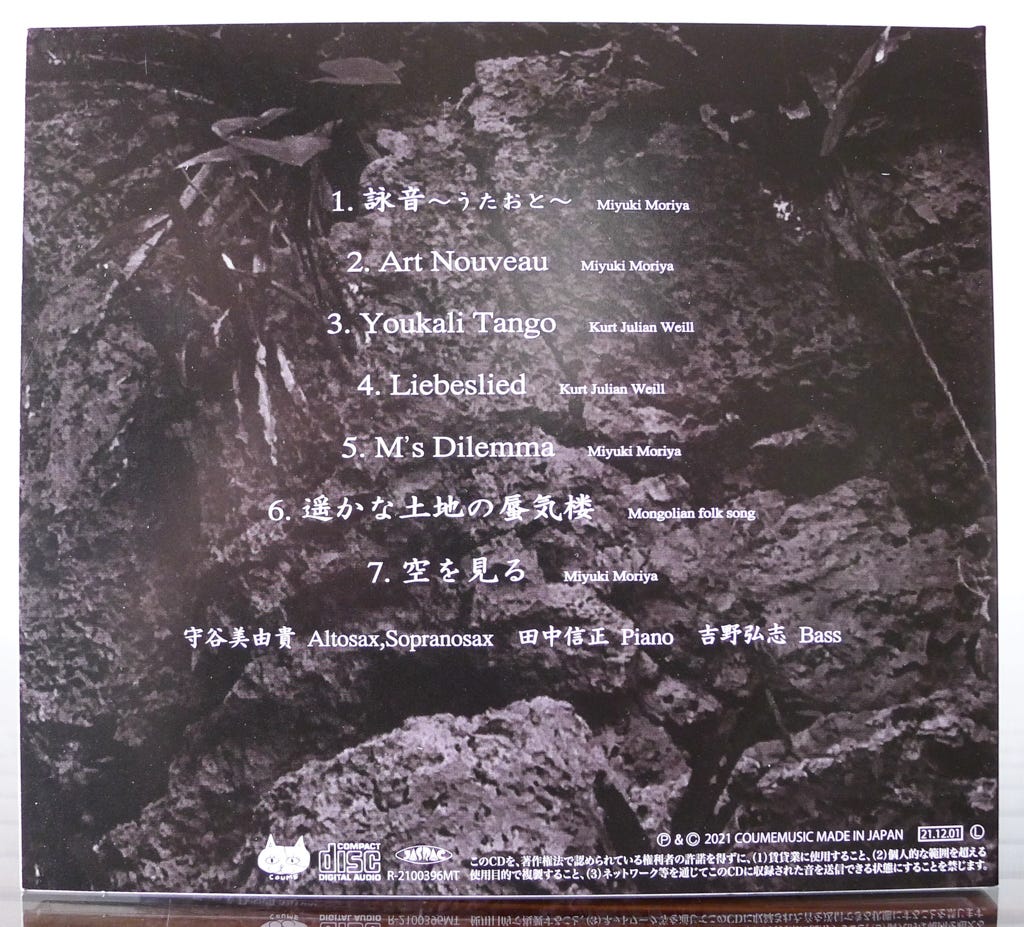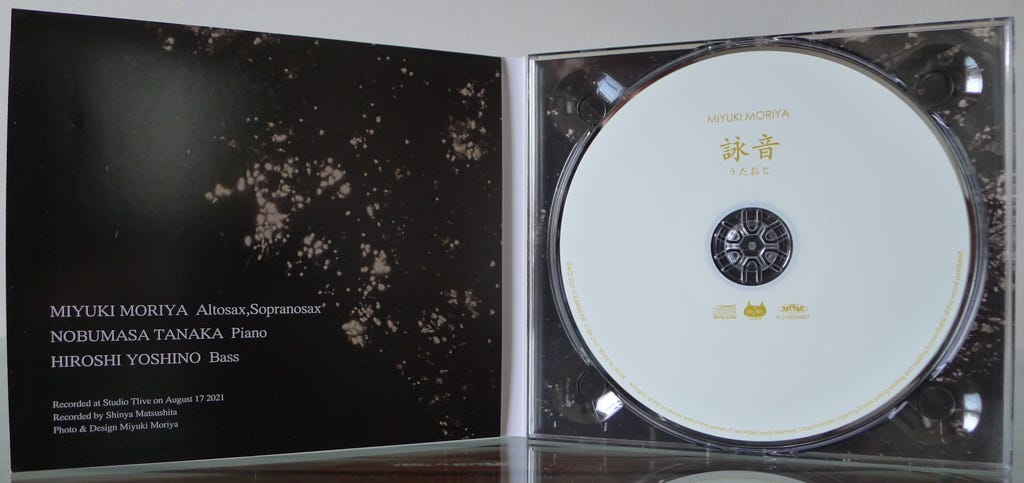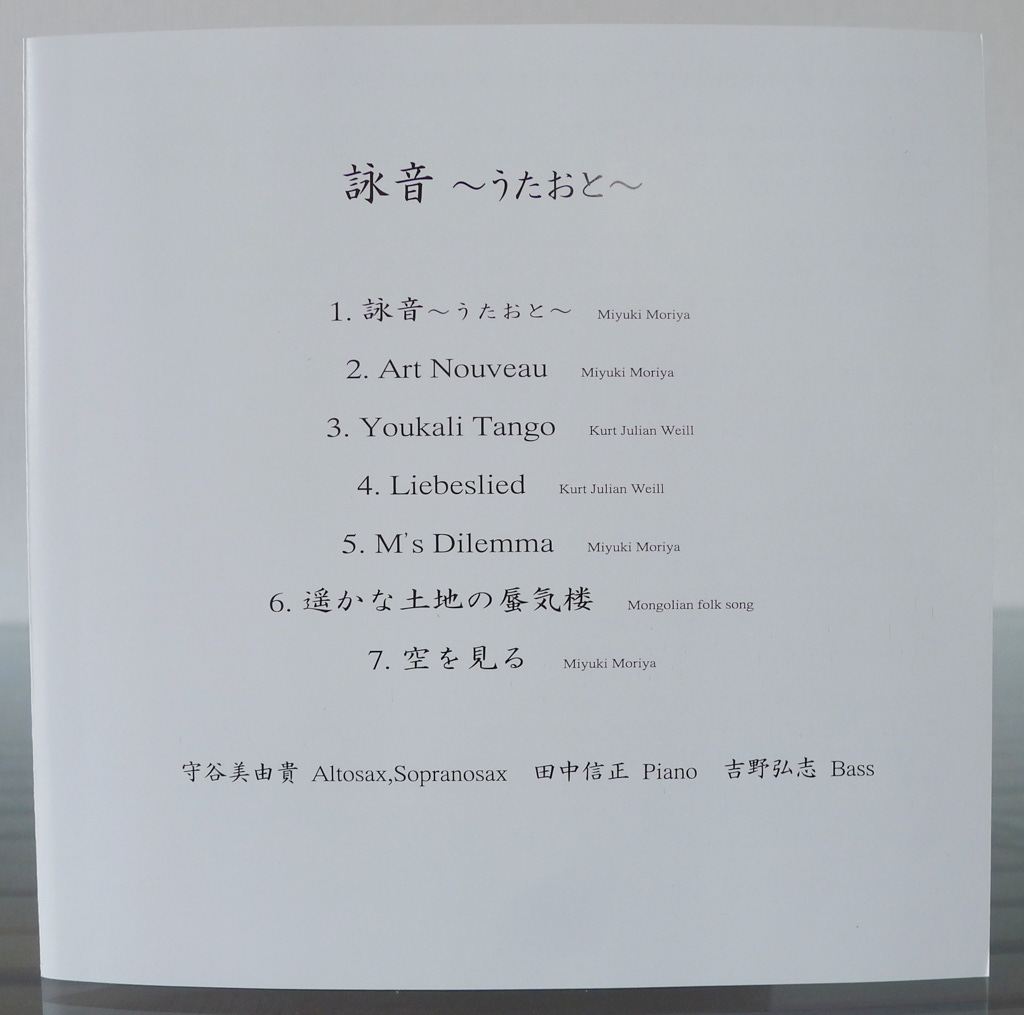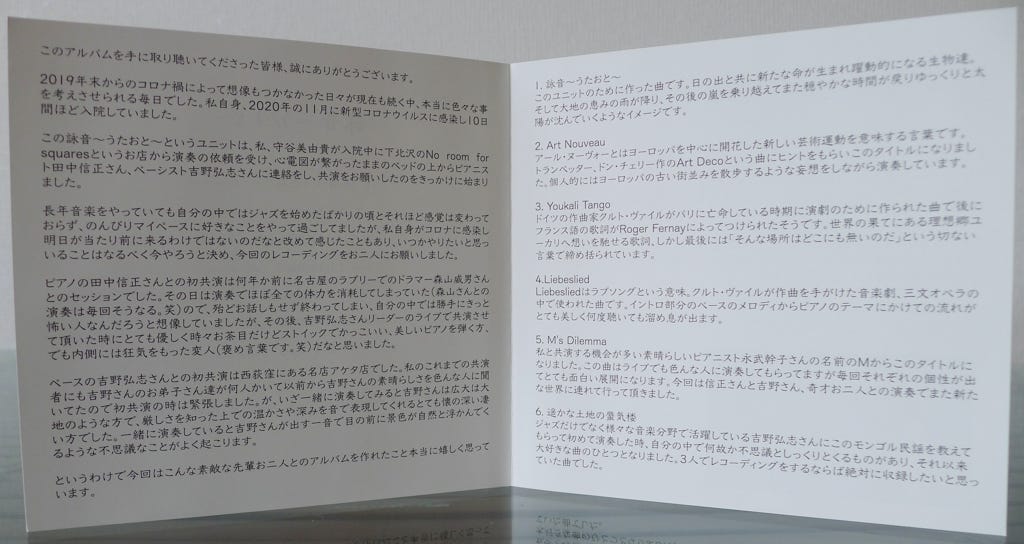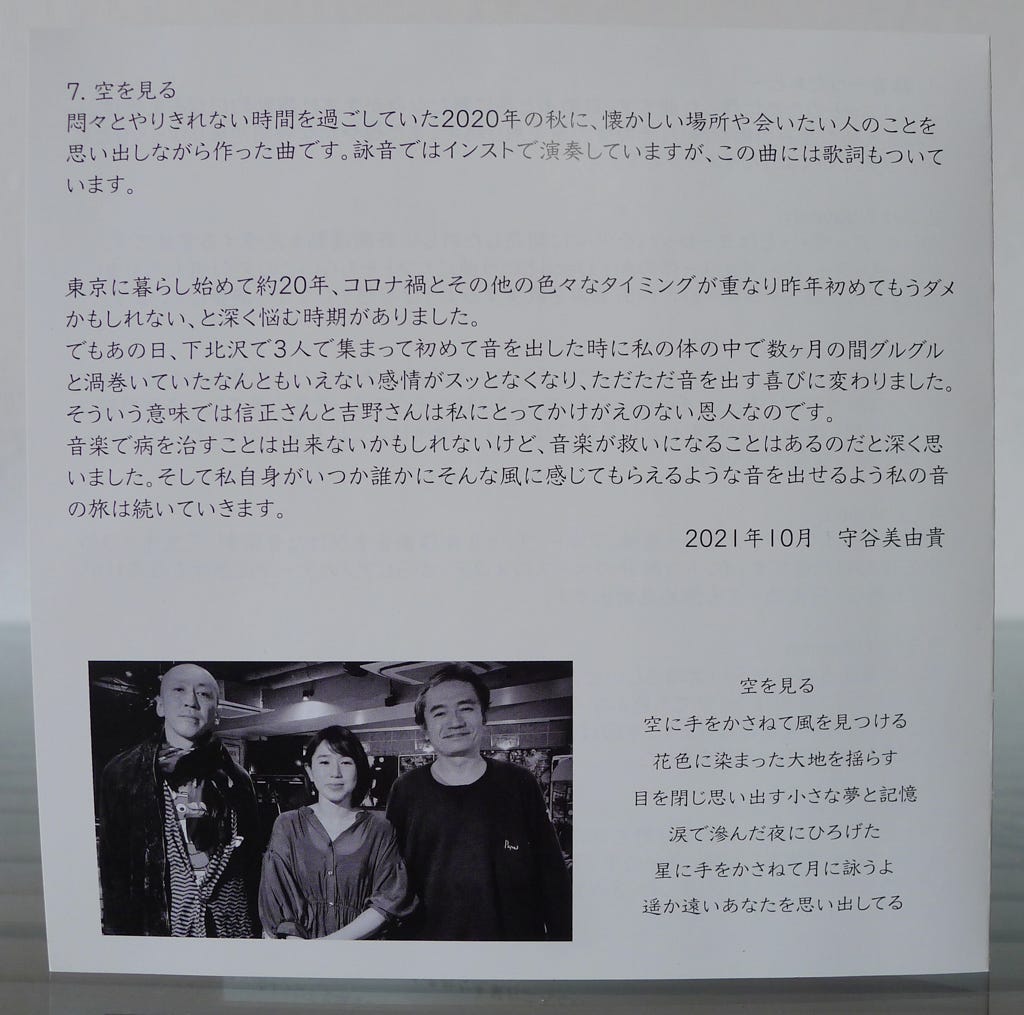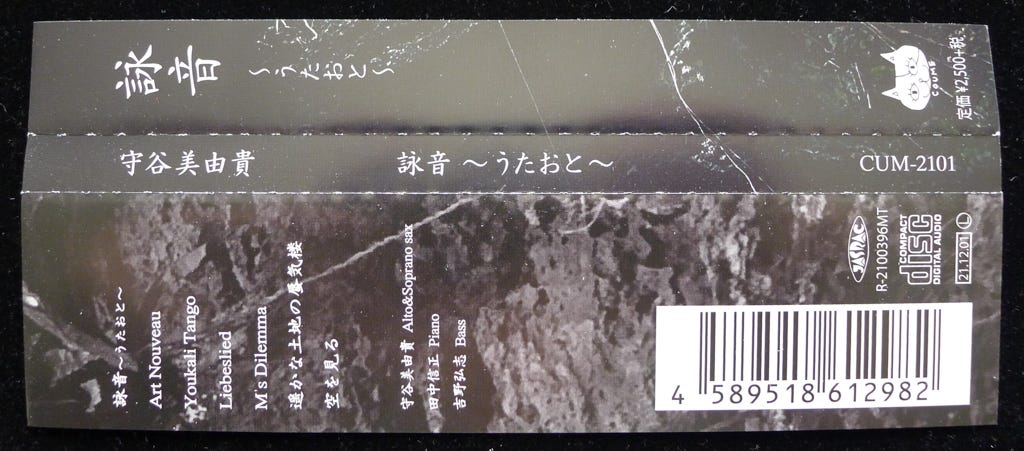Miyuki Moriya: Uta Oto
Uta Oto from sax player Miyuki Moriya is a modern jazz album full of emotion and spirit… a bit spiritual, even. The music created by Moriya’s trio ranges from brooding and wistful, to simple cheer, folk, free, and comforting. As the music plays the mood passes from somber strife to resurgence like a theme hinted at in the liner notes, a story of rejuvenation through musical inspiration and partnership.
In addition to playing original jazz with her long-running quartet, Moriya has also led less common formations including drummer-less trios (with sax, piano, bass), bass-less trios (sax, piano, drums), and chord-less trios (sax, bass, drums), as well as groups focused on the music of famous Japanese jazz musicians and composers.
On Uta Oto, Moriya leads a drum-less trio with pianist Nobumasa Tanaka and bassist Hiroshi Yoshino, generating a different energy with a loose, round sound without a standard quartet’s rhythmic drum hits and cymbal crashes, but a group that still creates locked-in rhythms and explosive energy when the music calls for it.
The seven tracks feature four originals, two songs by German composer Kurt Weill, and a Mongolian folk song. Soaring with authentic feelings, Miyuki’s originals: “Uta Oto” (beautiful sadness), “Art Nouveau” (lighthearted strolling), “M’s Dilemma” (wild whimsy), and “Sora wo Miru” (relaxing soulfulness). These distinctly original songs are set off by the two relatively darker Weill compositions with their staid tango and slow jazz shadows, and the atmospheric folk music with some natural and expertly wielded improvisation.
The album’s path through Moriya’s originals, traversing through two adjacent Weill songs and folk music, hints at a storytelling arc, from the multi-fold prologue through to hummable innocence, darker corners, free dissonance, human roots, and a final embrace by a soulful waltz. This journey and destination is like being welcomed to rest, comforting with feelings of home and hope. The sense of a spiritual aspect is not overt, but more like an undercurrent of soulfulness and a connection to nature displayed in both structured performance and unrestrained playing, and reinforced by the personal story laid out in the liner notes.
As for the album title and the uncommon word 詠音 (うたおと, Uta Oto), this is similar to everyday words for singing or reading (歌う, 読む). However, this word holds a deep and beautiful meaning as the sound of poetic reading from the heart with its melodic sounds or even chanting voices. This can be related to traditional Japanese poetic forms like haiku and tanka that convey deep meaning in few words with themes of nature, change, emotion, and contemplation. It adds an interesting dimension to this album, as it also makes its meaningful musical statement in poetic and soulful ways.
Liner Notes
(Translated from Miyuki Moriya’s original Japanese liner notes.)
Thank you everyone for picking up and listening to this album.
I’ve been thinking about all sorts of things every day since the unimaginable coronavirus pandemic began at the end of 2019. I myself caught the virus in November 2020 and was hospitalized for ten days after being infected.
In the middle of my hospital stay, I received a performance request from a place called No Room For Squares in Shimo-Kitazawa. While I was confined to bed and connected to an electrocardiogram, I reached out to pianist Nobumasa Tanaka and bassist Hiroshi Yoshino and asked them to play with me. That was how this group Uta Oto started.
Even though I’ve been playing music for a long time, my feelings haven’t changed that much since I first started playing jazz. I had spent my time doing as I like and at my own relaxed pace. But after being infected with the coronavirus, I realized anew that tomorrows aren’t guaranteed. I decided to try to accomplish what I want to now, as much as I can, and I asked these two musicians to record with me.
The first time I played with pianist Nobumasa Tanaka was at drummer Takeo Moriyama’s session at Lovely in Nagoya. On that day I had used up almost all my physical strength (that tends to happen every time I play with Moriyama, haha), so we ended up not speaking much afterward, and I arbitrarily imagined that Nobumasa Tanaka must be quite a scary person. But after that, when we played together at Hiroshi Yoshino’s gig, I realized that he was kind and cool with a mischievous streak and a beautiful piano style… but inside, he’s a crazy eccentric (meant in a good way, haha).
The first time I played with bassist Hiroshi Yoshino was at the famous spot Aketa no Mise in Nishi-Okigubo. I had played with many of Yoshino’s students by then, and I had often heard about Yoshi’s brilliance, so I was nervous to play with him. But from the first time we played together, I felt that Yoshino was a person as vast as the earth, who knew intensity and moreover expressed its warmth and depth through his sound. He is a broad-minded and wonderful person. Often when we perform, a strange thing happens as Yoshino can play a single note and cause a landscape to suddenly appear in front of my eyes.
That is all to explain how I’m extremely happen to be able to record this album with these two wonderful musicians.
詠音~うたおと~ (Uta Oto)
This is a song written for this group. Living creatures are reborn and become active with the sunrise. And as the earth’s blessed rain falls, and the following storm passes, calmness returns, and the sun sets… it’s that sort of a scene.
Art Nouveau
This is a word that refers to the new art movement that bloomed through central Europe. The song title was inspired by the song “Art Deco” by trumpeter Don Cherry. Personally speaking, I play this while fantasizing about old European streets.
Youkali Tango
This is a song composed for a play by the German composer Kurt Weill during his exile in Paris. It seems that Roger Fernay added French lyrics later. The lyrics describe a utopia called Youkali at the end of the world, but close at the end with the heartrending words “There is no such place anywhere”.
Liebeslied
Liebeslied means “love song”. This is a song composed by Kurt Weill and used in the musical play The Threepenny Opera. The flow from the intro’s bass melody into the piano theme is so beautiful and always makes me sigh no matter how many times I listen to it.
M’s Dilemma
The M of the title comes from the name of Mikiko Nagatake, a wonderful pianist whom I’ve had the opportunity to perform with a lot. I’ve played this song live with different people, and each time the different personalities surface with interesting developments. This time with Nobumasa and Yoshino, the rare genius of their performance took me to a new world.
遥かな土地の蜃気楼 (A Mirage in a Distant Land)
Hiroshi Yoshino is active is not only jazz but various musical fields. When he introduced this Mongolian folk song to me and we played it for the first time, it felt strangely right to me. Since then it’s become one of my favorite songs. As we were making a trio recording, this was a song that I absolutely wanted to include.
空を見る (Watch the Sky)
In the fall of 2020 during a period of unbearable anguish, I wrote this song as I thought about the places I missed and the people I wanted to see. On Uta Oto, it’s played as an instrumental, but there are lyrics for this song.
I’ve been living in Tokyo for about twenty years, and with coronavirus and other things piling up, it was a deeply troubling time, and for the first time last year I began to think things were impossible.
But on that day, when the three of us met and played the first notes together, the indescribable things that had been spinning around inside me for several months suddenly disappeared, turning into the utter joy of making music. In that sense, Nobumasa and Yoshino are irreplaceable lifesavers to me.
Music may not be able to cure disease, but I deeply believe that music can be a source of salvation. And I’ll continue to travel on my musical journey, striving to produce sounds that can someday make others feel that same way.
October 2021, Miyuki Moriya
(The liner notes end with a poem in Japanese. This is a humble attempt at a poetic translation to English.)
空を見る 空に手をかさねて風を見つける 花色に染まった大地を揺らす 目を閉じ思い出す小さな夢と記憶 涙で滲んだ夜にひろげた 星に手をかさねて月に詠うよ 遥か遠いあなたを思い出してる Look at the sky Hands together to the sky, find the wind The flower-colored earth sways Closed eyes recall small dreams and memories Spread through the night blurred by tears Hands together to the stars, sing to the moon Remembering you, so far away
Uta Oto by Miyuki Moriya
Miyuki Moriya - saxophone
Nobumasa Tanaka - piano
Hiroshi Yoshino - bass
Released in 2021 on Coume Music as CUM-2101.
Japanese names: Miyuki Moriya 守谷美由貴 (Moriya Miyuki) Nobumasa Tanaka 田中信正 (Tanaka Nobumasa) Hiroshi Yoshino 吉野弘志 (Yoshino Hiroshi)
Related Albums
Miyuki Moriya: Cat's Cradle (2010)
Audio and Video
Excerpt from “Uta Oto”, the first track on this album:


